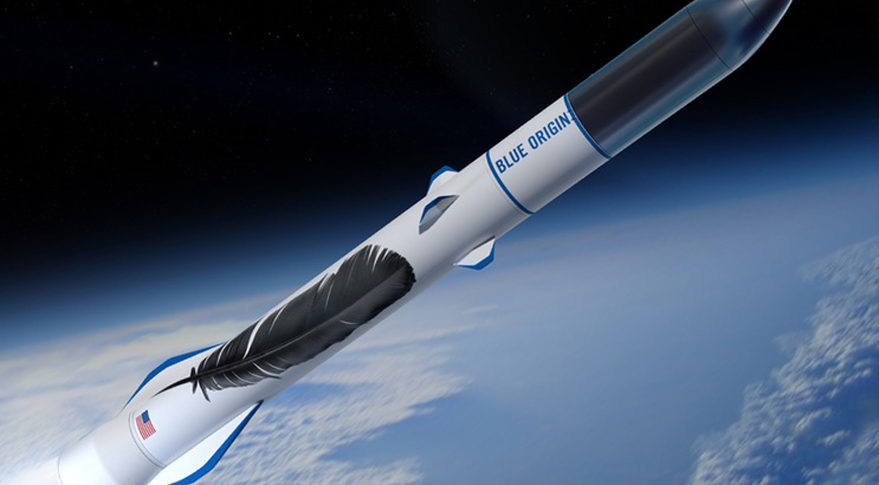New Glenn: Blue Origin's powerful reusable rocket
New Glenn's debut will mark Blue Origin's entry into the heavy-lift launch market.

New Glenn is a partially reusable heavy-lift rocket that's expected to make its first flight in December 2024. Its developer is Jeff Bezos' Blue Origin, which also flies the New Shepard suborbital tourism vehicle.
New Glenn continues the Blue Origin tradition of naming its rockets after American Mercury astronauts. The big new launcher is named after John Glenn, who made the first American orbital flight in 1962 and who returned to orbit in 1998, at age 78, for a space shuttle mission. (New Shepard is named after Alan Shepard, the first American to reach space.)
The shuttle flight made Glenn the oldest person to reach the final frontier, though he no longer holds that record.
How big is New Glenn?
New Glenn is one of the largest rockets out there. Here's a brief rundown of its physical characteristics and capabilities:
Height: 322 feet (98 meters)
Stages: Two, including a reusable first stage
Engines: First stage: Seven of Blue Origin's BE-4s. Upper stage: Two of the company's BE-3Us
Fuel: BE4s: liquid oxygen and liquefied natural gas. BE-3Us: liquid hydrogen and liquid oxygen
Payload fairing width: 23 feet (7 m), with twice the volume of a traditional 16.5-foot (5 m) fairing
Lift capacity: 14 tons (13 metric tons) to geostationary transfer orbit (GTO) and 50 tons (45 metric tons) to low Earth orbit (LEO)
History
Blue Origin has been developing New Glenn for more than a decade; work on the BE-4 engine, for example, began in 2012 or thereabouts. (Bezos founded Blue Origin in 2000, a year before Elon Musk started SpaceX.)
The company apparently called the new rocket "Very Big Brother" back in those early days; that was the placeholder name we heard in early 2016. Blue Origin was cagey about the vehicle until September of that year, when it officially unveiled the big new rocket's design and its name — New Glenn.
The initial plan called for both a two- and a three-stage variant, with a debut liftoff targeted for 2020. New Glenn's first stage was designed to be reusable, capable of launching up to 100 times.
Things changed, however, as they often do in spaceflight (and in life). The three-stage variant has apparently been ditched, and Blue Origin has lowered its sights on first-stage reuse, to a minimum of 25 flights.
In addition, the target date for the debut launch has slipped repeatedly; Blue Origin is now eyeing a liftoff sometime in December 2024 for that mission, which will send its "Blue Ring" spacecraft to Earth orbit on a National Security Space Launch certification flight called DarkSky-1 .
New Glenn will fly a variety of missions once it's up and running. Blue Origin has signed contracts with Eutelsat, Telesat and Thailand-based mu Space, for instance, as well as Amazon, which will use New Glenn (along with other rockets) to build its Project Kuiper broadband constellation in LEO.
Is New Glenn reusable?
The first stage of the big new rocket will be reusable, like that of Spacex's Falcon 9 and Falcon Heavy launchers.
The New Glenn booster will come back to Earth for vertical, powered landings on a drone ship at sea, about 620 miles (1,000 kilometers) downrange of the launch site. Initially, those liftoffs will all take place from Florida's Cape Canaveral Space Force Station, though Blue Origin wants to fly the big rocket from Vandenberg Space Force Base in California eventually as well.
New Glenn's baseline architecture calls for an expendable upper stage. However, Blue Origin is working to make that stage reusable as well, an effort known as Project Jarvis, which we first heard about in 2021.
New Glenn vs. SpaceX's Falcon Heavy and Starship
New Glenn is significantly taller than the Falcon Heavy, which debuted in February 2018 and currently has 11 missions under its belt. Falcon Heavy, like the Falcon 9, stands 230 feet (70 m) tall.
But Falcon Heavy has a higher lift capacity than New Glenn — 29.4 tons (26.7 metric tons) to GTO and 70.3 tons (63.8 metric tons) to LEO, according to SpaceX's specifications page.
SpaceX's new Starship megarocket, which is still in development, is far more powerful still: The fully reusable, 400-foot-tall (122 m) Starship will be able to haul 165.3 tons (150 metric tons) to LEO, and its expendable variant will be able to loft 275.6 tons (250 metric tons), according to SpaceX.
Join our Space Forums to keep talking space on the latest missions, night sky and more! And if you have a news tip, correction or comment, let us know at: community@space.com.
Get the Space.com Newsletter
Breaking space news, the latest updates on rocket launches, skywatching events and more!

Michael Wall is a Senior Space Writer with Space.com and joined the team in 2010. He primarily covers exoplanets, spaceflight and military space, but has been known to dabble in the space art beat. His book about the search for alien life, "Out There," was published on Nov. 13, 2018. Before becoming a science writer, Michael worked as a herpetologist and wildlife biologist. He has a Ph.D. in evolutionary biology from the University of Sydney, Australia, a bachelor's degree from the University of Arizona, and a graduate certificate in science writing from the University of California, Santa Cruz. To find out what his latest project is, you can follow Michael on Twitter.
- Elizabeth HowellFormer Staff Writer, Spaceflight (July 2022-November 2024)










